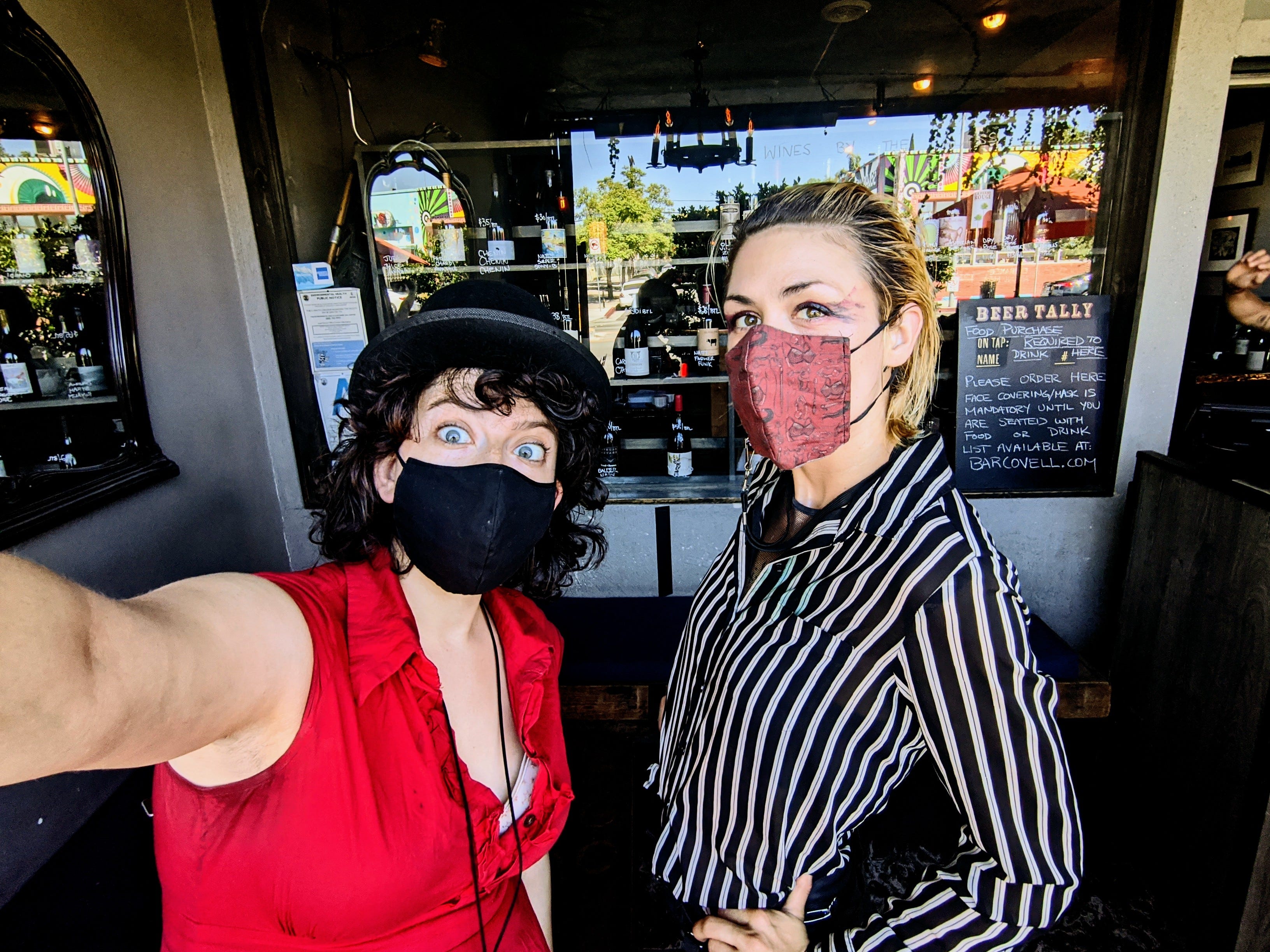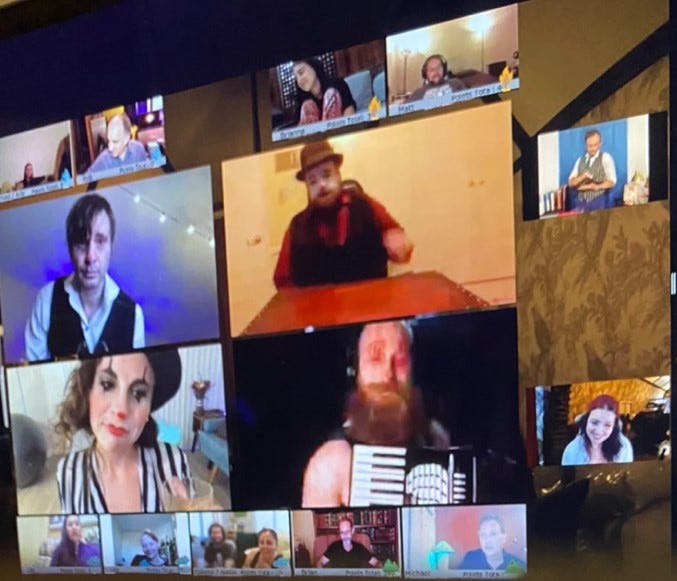‘C(ovell) in the C(loud)’ Rides The Edge of C(haos) (Review)
ABC Interactive adapts their signature experience for online audiences


At this point, 2020 is like a greatest hits album of all the terrible things that can happen. Each song sounds worse than the previous one, as they blur into each other, because the album is stuck on repeat. And since the record has been playing forever, it’s been warped, randomly skipping around, creating a new chaotic rhythm underscoring our lives. But is it actually chaotic? Did 2020 succumb to an unpredictable series of events that unnaturally collided together? Or is it because we’ve failed to address systemic problems in the United States that have all reached their breaking points simultaneously?
“Chaotic” is defined as being “in a state of complete confusion and disorder,” implying that causality lies within ourselves rather than from an uncontrollable external force. It’s this examination of life’s seemingly chaotic nature that ABC Interactive explores in its online remount of C(ovell), titled C(ovell) in the C(loud). And while the deftly constructed narrative navigates the chaotic aspects of life through clowning, magic, and gaming, C(ovell) in the C(loud) technologically asks too much of both the audience and itself.
(The following is based upon a press preview/dress rehearsal performance.)
I start Zoom with no expectations or knowledge of what’s to happen next. I’m a last minute replacement to attend C(ovell) as the previous NoPro correspondent has fallen ill (a normal, everyday ill, thankfully). In the hour I have between receiving the assignment to showtime, most of it is spent dusting off Skype. C(ovell)’s audience admission comes in two forms: either being a passive viewer watching on Zoom or being an active participant using both Zoom AND Skype. In following the setup instructions, it strikes me as a lot of logistics the audience needs to manage. But I shrug it off, thinking it only seems daunting as I’m a last minute attendee.
Once admitted to the Zoom call, I find myself engaging with a group of clowns, named Happy, Sad, Klutz, and Dumb (Dana Benedict, Terence Leclere, Ryan Schwalm, and Scott Sytten respectively) among other audience members during the pre-show segment (more explaining C(ovell)’s structure in a bit). But these aren’t your run-of-the-mill slapstick Bozos. These clowns take a note from commedia dell’arte, each identity personifying an emotion or mental state. They quickly and effectively pull me into C(ovell)’s world of magic and chaos through both impressive illusions and their own hilarious interpersonal dynamics.

Yet meeting these clowns is only the beginning of the experience. I find myself constantly and randomly dropped into Zoom breakout rooms to meet the rest of the cast. I start off trading magic trick-laced double entendres with Doc (James Lopez), losing track of what kind of “balls” we’re actually talking about quickly. Next is Miss Vega (Lena Valentine) in her parlor, a mystic who seems just as surprised as me when she correctly identifies that I’m a water sign. Last is The Lion Tamer (Keight Leighn) who strikes up a philosophical debate that I fail to follow because I’m too busy petting The Lion (Jordana Lilly, in a cage). Between the secluded and public interactions with the cast, I feel like we’re truly all partying at a bar together and I’m unsure of who I’ll meet next.
Laced within each interaction is mention of “The Game.” Some performers ask if I’m ready to play The Game while others tease me with little facts of what’s to come. Either way, I’m excited when The Speaker (Annie Lesser) brings everyone together to begin playing The Game. What follows in the next 90 minutes is a, let’s say, “competition of tasks” between teams of both the audience and performers to see who’ll be named the winner.
It’s here where ‘C(ovell)’ is found to be firing on all cylinders, both narratively and thematically, as The Game is played.
At the heart of every game, song, or character moment is an examination of the chaotic nature of life. While we all think (or perhaps hope) the chaos around us is out of our control, C(ovell) pushes a subtle message that perhaps this is a mess of our own doing. Is what happens in life truly uncontrollable? Or have we simply elected to exercise control over the wrong aspects, say, like being named the winner of an unimportant game? While being an online adaption of a previous production, C(ovell) in the C(loud) reminds me to take stock in how much influence I have in managing this hellish year.

Despite feeling some apprehension when informed of C(ovell)’s estimated run time of three hours, the experience’s structure is quite ingenious in allowing maximum audience agency and freedom. C(ovell) is broken up into three parts, a seemingly “unstructured” pre-show, the experience proper, then returning to an “unstructured” setup for the post-show section. It’s during the pre- and post-show sections where the audience can publicly or privately engage the performers, allowing them to make the most of playing in C(ovell)’s world at their own pace. Running late and didn’t get a chance to flirt with Doc? Say hi (or something more) to him after The Game. Had your fill after playing The Game? Leave the meeting whenever you wish to call it a night.
Get Patrick B. McLean’s stories in your inbox
Join Medium for free to get updates from this writer.
SubscribeSubscribe
C(ovell) ambitiously plays with how a free-flowing narrative structure functions online. But the technological limitations of both Zoom and Skype — two tools not designed for live immersive performance — unfortunately serves to undercut the experience for the audience.
(Minor logistical spoilers follow.)

Having Skype open allows C(ovell) to display a live video of its participating audience members playing The Game; simultaneously, ABC Interactive is also highlighting specific performers in a presentation in Zoom. Hard to picture? In other words, you know when you’re watching Wheel of Fortune and you see Vanna White in front of the big puzzle board AND also tiny close-ups of the players as they shout out their guess? That’s the look The Game takes, requiring both Zoom and Skype to pull it off.
Little did I know I was doomed to have issues before from the start of the show. While thinking I’d followed the setup instructions correctly, The Speaker sends me a message saying I am not showing up correctly on their end. When trying to fix it, via chat, I’m pulled into a breakout room where The Speaker tries to troubleshoot my setup one-on-one. It turns out my situation was a known hardware issue: some computers don’t allow Skype and Zoom to share usage of a built-in camera at the same time, requiring me to manually switch between them as needed throughout C(ovell).
While I didn’t mind taking on the ownership to switch my webcam between Zoom and Skype during the show, what if I didn’t feel comfortable doing this or, even worse, wasn’t able to do so on my own? While C(ovell) in the C(loud) has scoped out possible technical issues, it appears the extent of what the audience might need to do was not conveyed in its entirety beforehand. If there are very specific requirements to run C(ovell) at an optimal level, it would be to the audience’s benefit to know in advance so they may familiarize themselves with all required camera controls.
Shortly after The Game began its Wheel of Fortune-sque game show presentation, it crashed and never came back. While unfortunate, this is not a new problem. Issues occur during live performing arts shows even when done in person. What’s important is how these situations are addressed in real time when they do occur. The performers of C(ovell) in the C(loud) masterfully carried on, pivoting on the fly without missing a beat. If anything, the crash made everything chaotically more delightful and on brand in how to play The Game.
But thanks to my Zoom versus Skype issue, I didn’t know what to do when the feed crashed. Should I switch back to Zoom right away? Or should I wait to see if the issue could be fixed? My chats asking for help went unanswered. Nor was I able to discern if there was anyone else who could help. Eventually, I switched back to Zoom, which proved to be the right choice. But for how technology involved the design of C(ovell) is, it strikes me as odd that there’s no stage manager or designated backstage contact to help with issues. Any experience pushing both Zoom and Skype to their limits would benefit from having someone on hand to help both the cast and audience with issues as they arise. Having a stage manager on hand, a mere chat away for both the performers and the audience, would prevent one performer from being stuck juggling all the ringleader duties while keeping the experience afloat.
Despite being laced with computer problems that emphasize the need for better tools and platforms in the online immersive space, my time among the clowns, magicians, and lions of C(ovell) in the C(loud) was enthralling. ABC Interactive playfully engages in exploring the quick-to-come, quick-to-go chaotic nature of life, resulting in a profound and timely examination of the world we live in currently. After spending time in the cloud with the clowns, magicians, and lions, my 2020 doesn’t seem quite as nightmarish anymore.
An earlier version of this review cited an incorrect ticket price for single audience member admission, conflating it with the price for a couple. When corrected, the reviewer deemed that a specific criticism was no longer warranted, as the price difference was substantial. We regret the initial error.
C(ovell) in the C(loud) has concluded.
NoPro is a labor of love made possible by our generous Patreon backers. Join them today!
In addition to the No Proscenium web site, our podcast, and our newsletters, you can find NoPro on Twitter, Facebook, YouTube, Instagram, in the Facebook community Everything Immersive, and on our Slack forum.
Office facilities provided by Thymele Arts, in Los Angeles, CA.